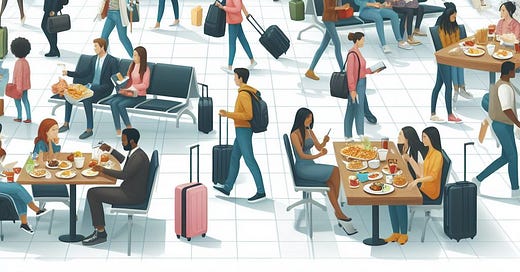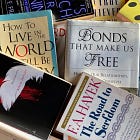We Are So Cared For, We Are So Loved
The future of civilization depends on recognizing that if we forget what creates the miracles of modern life, others will tear down what we fail to defend.
Recently, when disembarking a flight, the thank you I gave the pilot and crew was not perfunctory. Although my thank you probably didn’t seem effusive from the outside, a depth of emotion touched me after I delivered it.
Airline travel is one of the miracles of modern living, requiring human cooperation and coordination. Deeply, I felt the human connections the miracle of airline travel requires.
I’m still thinking about that recent flight. As I grow older, the miracles of human cooperation profoundly touch me. Since we live in rural America, flying takes a few more steps and hours of travel than for most.
A staggering number of people, visible and invisible, support modern travel. Think of people who work in auto and aircraft factories or parts manufacturing, the people who mine and refine raw materials, the farmers who grow our food, the truckers who transport food to restaurants serving us while we travel, the employees of the airlines, airports, car rental companies, hotels, and on and on.
After the flight, my next stop was the car rental counter and an interaction with Carlos. Carlos explained how my evaluation of him would help him reach his goal of moving up to management. Most companies who deliver service strive to create cultures that align their employees' self-interest with their customers' interests. Carlos seemed genuinely warm, but had he stayed in Cuba, would that side of his potentiality be developed? The interests of commerce led Carlos to develop the better side of his nature.
On the same trip, I found a restaurant I returned to many times over a week. The staff spoke little English, but I still made a warm and friendly connection.
Since the profit motive drives good service, the instances of poor service are jarring. Things mostly go well, and we don’t notice the web of human connections supporting our efforts.
We don’t notice how we are so cared for. We arrogantly forget how quickly we would perish if we depended solely on our own efforts.
In his book Students of Liberty, Leonard Read observed that “99% of our present population would perish in even a primitive, foraging society.” He added, “Man is interdependent! And his existence on this earth beyond a primitive state requires a recognition of this fact and a knowledge of how to deal with it skillfully.”
Student protesters on college campuses assert a claim of moral superiority, lecturing us about the greed of capitalism. They are ignorant of the web of interconnections that they are working hard to destroy. The privileged life they enjoy is because of capitalism.
The protesters vandalized campus buildings built by others for those who valued learning. Their professors have reduced the study of Western civilization's scholarship and ideas in favor of Marxist revolutionaries, such as Franz Fanon.
How dependent the protesters are on others was brought home when a Columbia University protester begged for “humanitarian aid” (food and water) for the protesters.
Yale professor Nicholas Christakis wrote of the protester’s plea: "This is the way someone who has never been challenged to defend her views with facts and reason speaks. This is someone who thinks she is winning the battle of ideas simply by articulating her desires. Someone her university has not taught."
Will the protesters learn that you will not be so well cared for when you step out of the web of connections?
When we embrace the bonds of voluntary human cooperation and don’t interfere with the rights of others, we are cared for. But why does the title of my essay claim we are loved? I’m not referring to God’s love, nor am I referring to romantic love. I am referring to the love produced by voluntary human cooperation.
Given the reality of human interdependence, Read explained two principles regulating social conduct. One, Read tells us, is the principle of violence and the other is the principle of love. Read writes, “The alternative to violence is love.” He continues,
Love, as here used, refers to the application of the kindly virtues in human relations such as tolerance, charity, good sportsmanship, the right of another to his views, integrity, the practice of not doing to others what you would not have them do to you, and other attributes which result in mutual trust, voluntary cooperation, and justice.
Mutual trust develops as we experience kindly virtues in our day-to-day life.
Unlike Carlos, the protesters are developing the worst side of their nature. The protesters are full of venom and hatred for Jews and America. The love that Read writes about leads to deep feelings of connection and empathy for others.
If the college protesters understood that they, too, could be cared for and loved by impersonal forces they didn’t create and can’t control, they might turn to their better side of nature and begin to create rather than destroy.
A quote is widely attributed to Einstein, but there is no record of him saying it: “There are only two ways to live your life. One is as though nothing is a miracle. The other is as though everything is.”
The sentiment may sound good, but it misses the mark. There is a third, more typical way of living life: mostly forgetting that everything is a miracle but sometimes remembering. The future of civilization depends on recognizing that if we forget what creates the miracles of modern life, others will tear down what we fail to defend.
A different version of this essay was published earlier at Intellectual Takeout.
At Mindset Shifts U, beginning June 22nd, we continue our exploration of transformational books with C. Terry Warner’s Bonds that Make Us Free: Healing Our Relationships, Coming to Ourselves.
In September, in time for the election, we will begin our study of F. A. Hayek’s The Road to Serfdom.
If you can become a paying subscriber today, your support makes possible these essays and Mindset Shifts U.





Beautifully written. ❤️🙏
Thank you Barry - beautiful.
Thoughts in response:
WE DISCOVER PEACE AND POSSIBILITY BEYOND THE KNOWN.
Peace is possible. It exists for you and me apriori to all our beliefs, opinions, judgements and knowledge.
Are we willing to surrender what we know for peace?
I mean to surrender, absolutely and ultimately, our accumulation.
And it isn’t as if what we know isn’t of value. Much of it is.
It’s when we take anything, yes anything, we know as being the truth; our truth becomes problematic for us, others, and planet Earth – including what’s written here if taken as the truth.
Taking anything as the ultimate fact of that matter gets in our way of seeing further into the unknown - the yet-to-be-seen - and discovering something of greater value.
And in taking any discovery – any breakthrough – any life-transforming revelation, no matter what it may be - as the ultimate truth becomes the hell on Earth we witness today.
In releasing ourselves from the known and delving into the yet-to-be-seen, we experience our innate unconditional kindness and understanding of ourselves and others.
We discover the wisdom and common sense seen and offered by the saints, sages, and wise throughout human history.
Might that discovery be of value to you, your family, community and humanity?
What if it was?
What might be?
What if?
Warmly … John